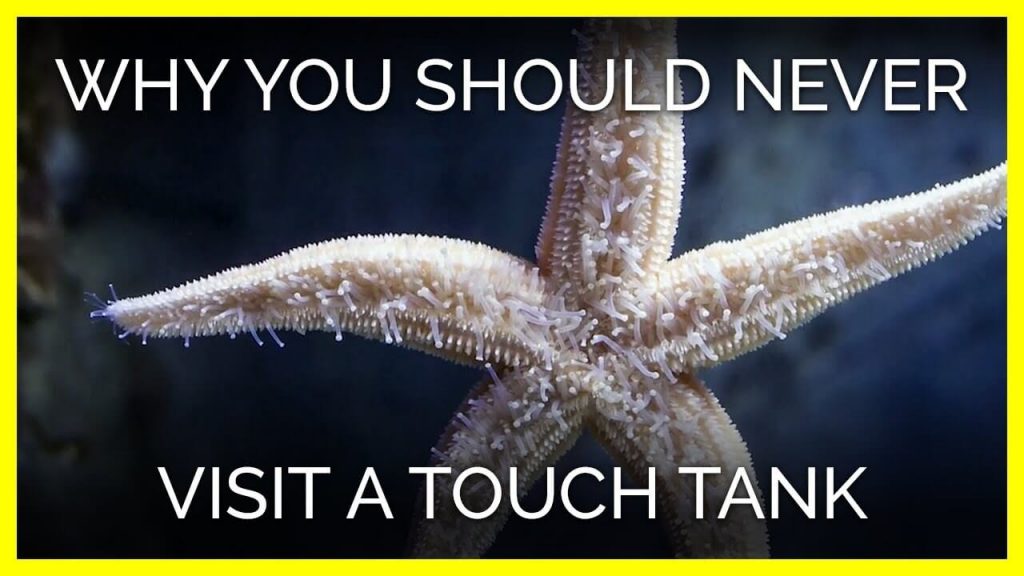This week, SeaWorld Orlando is running its “Ultimate Shark Experience,” in which workers will allow the abusement park’s guests to prod, feed, pet, and otherwise stress the facility’s imprisoned shark. This revolting event touts a “luxury” package with dining and drinks included, but like the seedy operation’s usual shark encounters, it exploits these vulnerable animals in the name of “conservation.”
SeaWorld Shark Encounters Miseducate the Public
Captive-shark petting encounters teach the public that these fish are comfortable in cramped tanks that feel as small to them as a bathtub does to a human and content with handsy customers of all ages harassing, grabbing, poking, and prodding them.
Sharks in their natural habitat may travel up to 45 miles daily, working together to obtain food. Some even cross entire oceans over the course of their lives.
During SeaWorld’s “up-close” shark encounters, park staff encourage guests to engage with the animals from above their tanks.
But when greedy companies like SeaWorld imprison sharks in tiny tanks, they have nowhere to go, which thwarts their natural instincts. They swim in constant circles, and some even sustain injuries to their noses as they rub against the sides of the tanks. Sharks exploited for encounters or kept in “touch tanks” die in large numbers due to illness, equipment malfunctions, and the unrelenting stress of being kept in miserable, cramped enclosures.
See Why You Should Never Visit ‘Touch Tanks’
To make matters worse, sharks aren’t protected under the federal Animal Welfare Act, so their deaths at SeaWorld and other shady, exploitative operations aren’t even tracked.
SeaWorld Orlando also advertises packages to swim with sharks at its sister park, Discovery Cove. These swims are highly invasive, hands-on events in which sharks, dolphins, and other ocean animals are forced into full-body encounters with humans.
Swimming encounters at marine parks are hell for animals. One whistleblower called the experiences she witnessed as a “swim with dolphins” attraction photographer “traumatizing.”
Sharks Aren’t a Major Threat to Humans
Marine park “experiences” that abuse captive sharks also use imagery of certain types of sharks to thrill visitors, playing into stereotypes of sharks as dangerous, ferocious predators. This skewed portrayal perpetuates the myth that sharks are always hazardous in their natural habitats.
On average, only 63 humans a year are bitten unprovoked by sharks worldwide. Most of those bites are not fatal. On the flip side, humans kill approximately 100 million sharks worldwide every year.
SeaWorld’s ‘Conservation’ Supports Animal Imprisonment
SeaWorld is a shoddy park that knows it has a bad rap. That’s why it sells a fantasy about animal conservation along with every ticket. The park brags that 11% of the Ultimate Shark Experience’s final ticket income goes to its “conservation fund” … but what does that really mean for ocean animals?
Real conservation efforts focus fully on supporting and protecting animals in their natural habitats. If SeaWorld had a real commitment to conservation, it wouldn’t imprison animals in tanks for human entertainment.
It’s also worth noting that SeaWorld contributed only 0.1% of its profits to “conservation” in 2021. Any gestures the company may have made to help animals are far outweighed by the egregious daily suffering and staggering number of deaths they endure at its parks. Overall, SeaWorld’s purported engagement with “conservation” is nothing more than a money-making strategy through which the company deploys deceptive marketing and dupes visitors into thinking they’re supporting a good mission, which encourages them to spend more on it.
Never Visit SeaWorld—or Any Other Facility That Exploits Sharks
Visiting SeaWorld supports the exploitation and suffering of sharks, along with countless other marine animals. Please pledge to boycott SeaWorld, and if your friends or family ever consider going, let them know why they should change their plans.
The post SeaWorld’s ‘Shark Experience’ Not So ‘Ultimate’ for Abused Sharks appeared first on PETA.

